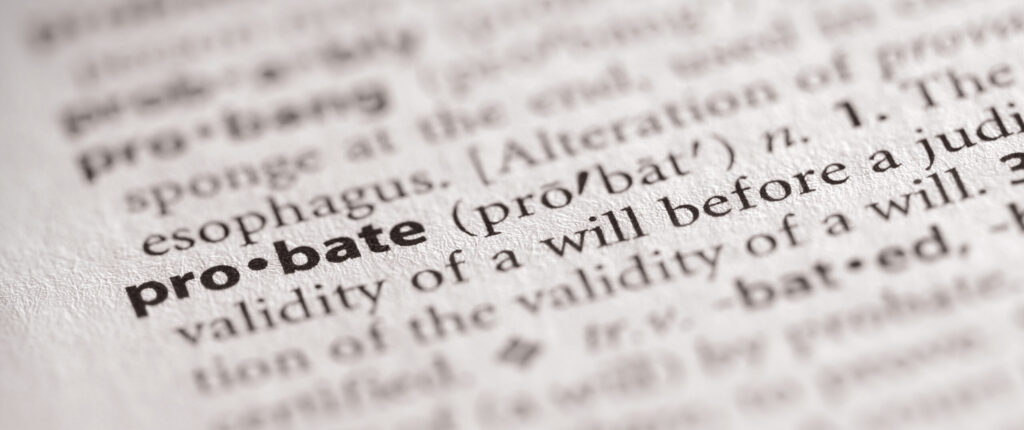Suppose you were notified about your status as an estate beneficiary over a year ago, but you still have not received your inheritance. When you asked the executor for an update, they claimed your inheritance is late because probate is still ongoing. You may be wondering: How long does probate take?
While it can be frustrating to have to wait a long time to receive the inheritance your deceased loved one left you, it’s not unheard of for the probate process to take months or even years.
At the same time, if you’ve waited an unreasonable amount of time for your inheritance without the executor/administrator having provided you with a specific reason for the delay, alarm bells should go off in your head.
Although benign factors (e.g., your loved one having died with substantial debts) could cause distributions to take longer than anticipated, harmful factors (e.g., the executor stealing from the estate or slacking on their duties) could as well.
The only way for a beneficiary to determine whether valid reasons exist for their inheritance being delayed is to play an active role in the estate administration process. This way, they’ll notice if anything is amiss with their inheritance and can investigate the matter further.
Before delving into the issue of how long the executor has to pay the beneficiaries, read our overview of probate in the next section, which may shed some light on why your inheritance may take a while to get to you.

What Is Probate?
Probate is the court-supervised process a decedent’s estate must pass through if they died with “probate-able” assets, which are assets that were individually owned by the decedent and are not being transferred through other means, such as by a trust, deed or beneficiary designation.
Estates containing probate-able assets must pass through the probate process whether someone dies without a will or with a will. This is to ensure estate assets are passed on to heirs in accordance with the laws of intestate succession (if the decedent died without a will) or to beneficiaries in accordance with the terms of the decedent’s will (if they had one).
For small, non-complex estates, there may be simplified probate procedures (e.g., small estate affidavit or spousal property petition) that can be used in place of a formal probate.
Probate is supervised by the personal representative of a decedent’s estate. If a decedent died with a will, the personal representative usually will be the executor named in the will. If a decedent died without a will or the court decided to appoint someone other than the executor named in the will, the personal representative will be referred to as the administrator, and they usually will be a close relative of the decedent.
The probate process generally is initiated by the named executor or tentative administrator lodging the decedent’s will with the court (if there is a will) and filing a Petition for Probate. Once the court receives the petition, it will set a date for the initial probate proceeding, which is where an executor or administrator of the estate will be appointed to oversee the probate process and make distributions of estate assets to beneficiaries or heirs upon its completion.
An executor or administrator cannot access estate assets or take any actions on behalf of the estate until they are officially appointed by the court.
Whoever files the probate petition must mail a notice to all persons mentioned in the will and all of the decedent’s heirs-at-law (i.e., those persons who would stand to inherit from the decedent if the decedent died intestate) at least 15 days prior to the date of the initial probate proceeding. This way, if any interested party wishes to have the will’s admission into probate denied for any reason, they can either file a written objection in advance of the proceeding or appear in court to object to it in person.
How Long Does Probate Take With a Will?
It’s common for people to falsely believe they will receive their inheritances immediately following the decedent’s death, but the reality is that the executor generally won’t be able to provide them with their inheritances until they’ve had the opportunity to execute the will.
How long does it take to execute a will? While timeframes can be shorter or longer depending on the size and complexity of the estate, probate typically takes anywhere from nine to 24 months. However, it is not usual for certain probates, e.g., ones with substantial values that exceed the federal exemption amount and/or with complex business interests, to last several years.
Suppose the executor is unable to track down certain assets belonging to the estate, leading them to believe someone close to the decedent, such as their caregiver or power of attorney, had been stealing from them. This could prolong the probate process, as the executor may have to investigate the matter further and possibly even litigate to recover the stolen assets.
How Long Does Probate Take Without a Will?
The same steps required to complete probate when there is a will generally are required to complete probate when there is no will; therefore, the probate process without a will may take roughly the same amount of time — around nine to 24 months on average — as probate with a will.
If anything, probate without a will could take less time, since intestate succession laws generally can’t be contested in the same way wills can be contested. Any litigation, whether it be a will contest or property dispute, is likely to prolong the probate process.
Intestate succession laws also are not ambiguous in terms of instructing which heirs are entitled to an inheritance and what portion of the estate each heir should inherit. For example, it is set in stone that a surviving spouse should be provided with 100% of the community property and a portion of the decedent’s separate property (which is determined by what other heirs the decedent left behind).
Estate Settlement Timeline Rules: How Long Can You Keep an Estate Open After Death?
Suppose an estate is not settled after three years of probate. While you understand probate can take time, this seems like an unreasonable amount of time for beneficiaries to not have received their inheritances. You’re right to question: How long does an executor have to settle an estate?
Again, while there is a time limit for the executor to distribute estate assets, it can be easily extended for a number of valid reasons, including everything from the appointed executor resigning to the will being contested.
Remember, a probate attorney is always available to help if probate is taking too long, and the executor is not communicating with beneficiaries about what is causing the delay.
In the following sections, we go over the answers to commonly asked questions surrounding the estate settlement timeline.
How Long Does the Executor Have to Read the Will?
Movies and TV shows often depict the executor reading the will aloud to beneficiaries and other members of a decedent’s family shortly after the decedent’s death; however, in California, it is not required for the executor to read the will.
That said, the executor (or whichever party files for probate) is required to mail notice to beneficiaries and the decedent’s direct heirs at least 15 days prior to the initial probate proceeding, as we already discussed.
Known and reasonably ascertainable creditors of the decedent must be notified of the decedent’s death as well. The personal representative should do this by publishing administration of estate notices in a local newspaper for at least 15 days.
Failing to notify interested parties in a timely fashion could result in probate being delayed. Suppose a beneficiary wasn’t notified about the initial probate hearing, but finds out about it six months after the fact. They potentially could bring a will contest to try to have the will’s admission into probate revoked on this ground, which likely would prolong the probate process.
When Can an Executor Distribute an Estate to Beneficiaries?
Perhaps it’s been 18 months since probate began, but you still have not seen or heard anything about your inheritance. When you question the executor about its status, you are told your inheritance cannot be released to you until the probate process completes. If you are unfamiliar with probate, you may not understand what this means.
The probate process consists of the following steps:
- Authenticating the decedent’s will (if one exists).
- Appointing an executor/administrator.
- Accounting for all of the decedent’s probate-able assets.
- Paying the decedent’s and estate’s taxes.
- Satisfying all valid creditor claims surrounding the estate.
- Litigating any disputes surrounding the estate (if any have been brought).
The personal representative generally cannot distribute the estate to beneficiaries until all the steps of the probate process have been completed.
What does this mean for beneficiaries and heirs? Consider an estate that has more debts than it does assets. In this situation, beneficiaries/heirs may receive no inheritance at all, even if they are mentioned in the will or are considered a direct heir under intestate succession.
There are a couple exceptions to this rule. For instance, if the decedent’s surviving spouse or child (even if they are adult children) had been financially dependent on the decedent when they’d been alive, they may be able to petition the court for what is known as a family allowance, which could help them make ends meet until they receive their inheritances.
The decedent’s immediate family members may also be able to petition the court for what is known as a probate homestead exemption, which would allow their surviving spouse and minor children to remain in the family home until the former dies or the latter reach legal adulthood.
What Is the Time Limit for an Executor to Distribute Estate Assets?
If you’re an executor with many responsibilities unrelated to the estate you are tasked with overseeing, you may wish to place your administrative responsibilities on the back burner until your schedule opens up. You may be wondering: How long do you have to close an estate?
California generally requires for the executor to distribute assets within a year of being appointed, although there are many circumstances that can cause the executor to require more time, which they may be able to get by requesting an extension from the court.
If an executor is uncertain about their ability to complete the probate process in a timely fashion, it generally would be preferable for them to either decline their appointment or resign from their role instead of stepping into the role or continuing to serve.
It’s important to emphasize that the clock does not start ticking for the personal representative until they are officially appointed to the role, which happens at the initial probate proceeding. While the court generally asks for probate to be opened within a year of the decedent’s death, it hypothetically could be opened at any time — although waiting to open probate can be detrimental to the value of the estate and is not recommended.
If you know you are supposed to inherit from a decedent’s estate, but have not yet been notified of your beneficiary status, it may be because probate still has not been opened.
If the personal representative is failing to act and it has been months since the decedent’s death, you may wish to open probate yourself (supposing you’re an interested party) to prevent the estate from suffering unnecessary financial losses, which could result in a reduced or eliminated inheritance for you. A probate attorney can help you with this process.
How Long Can an Executor Withhold Money From a Beneficiary?
An executor generally is not permitted to withhold money from a beneficiary for any reason after the probate process comes to a close.
In other words, the executor must promptly pay beneficiaries their rightful inheritances once the decedent’s assets have been accounted for, their taxes and debts have been paid, the estate disputes have been settled and the court has approved distributions to the beneficiaries or heirs.
Estate distributions usually come in the form of lump-sum payments. To make them, the personal representative will need to file a petition for final distribution with the court to obtain permission to distribute whatever assets are remaining in the estate to beneficiaries or heirs.
If a petition for final distribution is approved, the personal representative can proceed with providing each beneficiary or heir with their allotted portion of the estate.
Even if an executor believes they have a valid reason for withholding a beneficiary’s inheritance (e.g., the beneficiary has a substance abuse issue), doing so is almost never allowed.
Can a trustee withhold money from a beneficiary? You may be surprised to learn that in some instances they can. Find out how the rules for trust fund distributions differ from the rules for estate distributions.

Why Does Probate Take So Long?
It’s not unusual for probate to last years, particularly when it comes to estates that are large and complicated, or are embroiled in litigation. This is precisely why many people don’t use a will as their sole estate planning document; they also execute a trust or utilize beneficiary designations to allow their loved ones access to their assets faster.
That said, if probate is taking an unusually long time, and there isn’t any ascertainable reason for the delay, beneficiaries should take action to at least get to the bottom of what is happening with the estate, if not to compel the executor to provide them with their inheritances.
In the following sections, we go over possible reasons why probate may be taking a long time to help you understand whether the delay you may be facing in receiving your inheritance is valid or problematic.
Delay in Opening Probate
As we already touched on, it is not required for probate to be opened immediately following a decedent’s death. If an executor waits months to open probate, it’s to be expected that distributions may be delayed.
Many times, the executor delaying the opening of probate is a strategy to try to save the estate money. By running down the clock, they may be able to have creditor claims time-barred, since creditors only have one year from the date of the decedent’s death to file their claims.
This strategy to try to save the estate money, however, could end up backfiring, as creditors who are owed money from the decedent’s estate are regarded as interested parties, which means they could open probate themselves. This could potentially leave the decedent’s assets in the hands of a third party creditor, rather than in the hands of whom the decedent nominated to be the executor of their estate.
For their part, creditors should keep in mind that they can pursue repayment of debts even if they have not been properly notified of the decedent’s death. In fact, they should pursue repayment of debts as soon as they learn a debtor has died.
While beneficiaries and other interested parties should give the executor some time to get their ducks in a row before opening probate themselves, they should not altogether disregard the issue of an executor failing to act if it has been months since their loved one died and they’ve not heard anything in regard to the opening of probate. In fact, they should get in touch with a probate attorney as soon as possible to devise a strategy with which to proceed.
Estate Is Complicated
As you might expect, an estate containing predominantly monetary assets generally will be less complicated than an estate containing a combination of monetary and real property assets or business interests. Estates that are complicated generally require significantly more time to settle.
Part of an executor’s role is having estate assets valued. Cash and cash-equivalent assets are easy to value by reviewing the decedent’s bank statements on the date of death. Assets like jewelry, cars, real properties, and business interests are more difficult to value, which can take time.
In the same vein, some assets may need to be sold to provide beneficiaries with their inheritances. Suppose two beneficiaries were left equal portions of a house. In most cases, a home cannot be fairly and equitably divided, so unless the beneficiaries are seeking to jointly own the property, the executor may wish to sell the property in order to be able to divide the proceeds from the sale between the beneficiaries. This, too, can take time.
In general, estates containing real properties will take a substantially longer time to settle than estates with mostly liquid assets.
Decedent Has Extensive Debts
If a decedent died with extensive debts, it could delay when beneficiaries ultimately receive their inheritances. This is because the executor will have to carefully evaluate every creditor claim entered with the estate to confirm it is valid prior to satisfying it.
If an executor were to deny a creditor claim they believe to be invalid, it may result in a creditor dispute, which could cause probate to be prolonged even more.
Only after all valid creditor claims and judgments have been satisfied may the executor be able to proceed with filing a petition for final distribution.
Disputes Over Will
If there is a dispute over a will, it’s likely the probate process will be delayed because of it. While there are many types of will disputes, the two main types surround the validity of the will and ambiguous language in a will.
When a dispute is brought concerning the validity of a will, the dispute is referred to as a will contest. A will contest seeks to have a will voided by the court because the document meets one or more of the grounds for contesting a will.
When an interested party objects to a will’s admission into probate, it will likely result in the probate process being significantly delayed.
If a will is contested after it’s already been admitted to probate, the resulting litigation almost always will prolong the probate process, since the executor may have to wait for the dispute to be resolved before they can proceed with their administrative tasks.
If beneficiaries wish to contest a will, they should keep in mind that the deadline for contesting a will is 120 days from the date the will is admitted to probate.
Another dispute that can arise concerning a will has to do with ambiguous language. Suppose a will instructs for a real property to be divided among the decedent’s children, but fails to name specific children. If the decedent had biological children and stepchildren, confusion could arise surrounding whether the decedent intended for the property to be divided among both their biological children and stepchildren or only among their biological children.
When these types of ambiguities are contained in a will, a type of matter known as a petition for instructions may need to be filed with the court to obtain clarification about the meaning of the ambiguities. This can result in the probate process taking longer than usual.
Will disputes can also involve disqualified or prohibited beneficiaries, and spouses or children who were unintentionally omitted from a decedent’s will.
Property Disputes
Disputes over property span a wide spectrum. In probate, one of the most common types of property disputes involves the recovery of property.
Suppose an estate beneficiary exerted undue influence on a decedent at a time when the decedent had been sick and mentally unsound in order to have the decedent sign a deed conveying a real property to them. If the executor or other interested parties learn about the suspect deed transfer, they may bring a property dispute to both contest the deed and recover the real property.
As you might suspect, without having clarity about the true owner of property being held by an estate, the executor will not be able to distribute any assets. As such, when there are disputes surrounding estate property, probate is likely to take longer.
Executor Misconduct
Unfortunately, a delay in beneficiaries receiving their distributions can sometimes be related to executor misconduct. Being that executors are charged with looking out for the beneficiaries’ best interests and protecting the estate, it can be disheartening to learn they are doing the exact opposite.
Executor misconduct can include everything from the executor stealing assets or misvaluing them to the executor failing to keep beneficiaries reasonably informed about the status of estate administration.
When an executor fails to perform the duties of their role accurately and ethically, it can both prolong the probate process, as well as reduce the value of the estate.
For this reason, beneficiaries should not take any suspected executor misconduct lightly; they instead should take prompt action to protect the estate, and by extension, their inheritances.
What to Do if an Executor Is Not Paying Beneficiaries
If the probate process is taking too long or is complete, but you still have not received your inheritance from a decedent’s estate, it may be necessary for you to investigate the matter further.
It is not a good idea to jump to conclusions by, say, accusing the executor of misconduct. This could put you at odds with the executor, which could make future interactions with them difficult.
Rather, you should take the proper legal steps to resolve the matter. We go over what these steps are in the following sections.
Remember, there are no hard or fast rules surrounding how long it should take to settle an estate. Estate settlement timelines can vary greatly.
1. Ensure probate is complete
Estate assets generally cannot be distributed to beneficiaries until the probate process is complete. If you’re a beneficiary with concerns that an executor is wrongfully withholding your inheritance, your first course of action should be to ensure probate is complete.
You can find out the status of administration by asking the executor for updates. A good idea would be to send your requests for information in writing. This way, you will have a log of interactions in the event you end up pursuing a fiduciary misconduct claim against the executor for failing to communicate.
2. Collect evidence
If an executor is withholding due and payable distributions to beneficiaries, you may need to turn to the court to get what you’re owed. But in order to determine the validity of your claim, the court will need to see evidence.
Evidence can include a log of the interactions you’ve had with the executor, any accountings the executor provided you (as they are required to provide an estate accounting for every year the estate remains open), the will itself and any other documents or communication you have that could help to prove your claim.
If the executor misconduct is so severe that you are seeking to remove and replace and/or surcharge an executor, a deeper investigation into their misconduct may be required. For example, estate accountings may have to be analyzed for red flags, as will the executor’s activities.
The evidence-gathering process can be difficult. You may not know what to look for or how to access it. For this reason, working with an attorney is a good idea if you plan to bring a claim against the executor.
3. Discuss the matter with a probate attorney
If you are feeling lost about what to do about your inheritance issue, know that a inheritance lawyer can be an excellent resource.
Probate attorneys deal with issues surrounding executors and inheritances on a daily basis, so they will be able to guide you about the best steps to take after learning the specifics of your case.
A probate attorney also can light a fire under an uncooperative executor, which could prompt them into action.
While there generally is nothing stopping you from pursuing a probate case on your own, it can be a challenge to secure the outcome you want with no prior knowledge of the law. Working with an attorney who knows the ins and outs of estate administration can increase the probability of a favorable outcome.
Hiring an attorney may require you to invest some money upfront, but in the long run, your investment is likely to pay off. Furthermore, in some cases (e.g.., ones involving executor misconduct), you may be able to recoup your attorney’s fees and costs from the responsible party, though this is not a guarantee.
4. File a petition to try to compel the executor to make distributions
If you’ve exercised all possible avenues for obtaining your distribution from an estate, but to no avail, the final step you may wish to take is to file a petition compelling the executor to make final distributions.
Remember, you should be certain all the steps of the probate process have been completed before resorting to litigation. Even if it feels like it’s taken forever for the executor to provide you with your inheritance, there is nothing the executor or court can do to get it to you sooner if, say, the decedent still has unpaid debts or taxes, or litigation surrounding the estate is ongoing.
If you’re certain probate has closed and the executor’s petition for final distribution has been approved, then there is no reason for the executor to not promptly provide you with your inheritance.
The evidence you collected in a previous step will come handy when drafting your petition compelling the executor to make final distributions. In the petition, you will want to provide the court with specific facts surrounding your claim, as it’s necessary to demonstrate to the court that the executor is wrongfully holding onto your inheritance, even though there is no reason for them to do so.
If pertinent, your petition could also seek to surcharge the executor for unnecessarily prolonging the probate process and failing to comply with their duties.
Once the court receives your petition, it will set a date for the court hearing. At the hearing, the court will review your petition and listen to oral arguments to determine whether your petition is valid. It is ideal to have an attorney accompany you to court to make compelling oral arguments on your behalf.
Is probate taking too long? Get to the bottom of why by working with our knowledgeable team of attorneys.
It’s natural to wonder how long an estate can stay open if you’ve been waiting forever and a day for your inheritance. While an estate remaining open for a prolonged period could be due to a bad executor, it could also be due to the estate being complex or large.
By working with a probate attorney, you won’t have to keep tabs on administration, as your attorney will do that for you — and they will know right away, thanks to their years of experience, if something is amiss with your inheritance or the executor’s conduct.
Don’t leave your inheritance up to chance. Rather, work with a knowledgeable probate firm that has an excellent track record when it comes to getting clients the results they are seeking in estate-related matters. Reach out today to request a free consultation.











